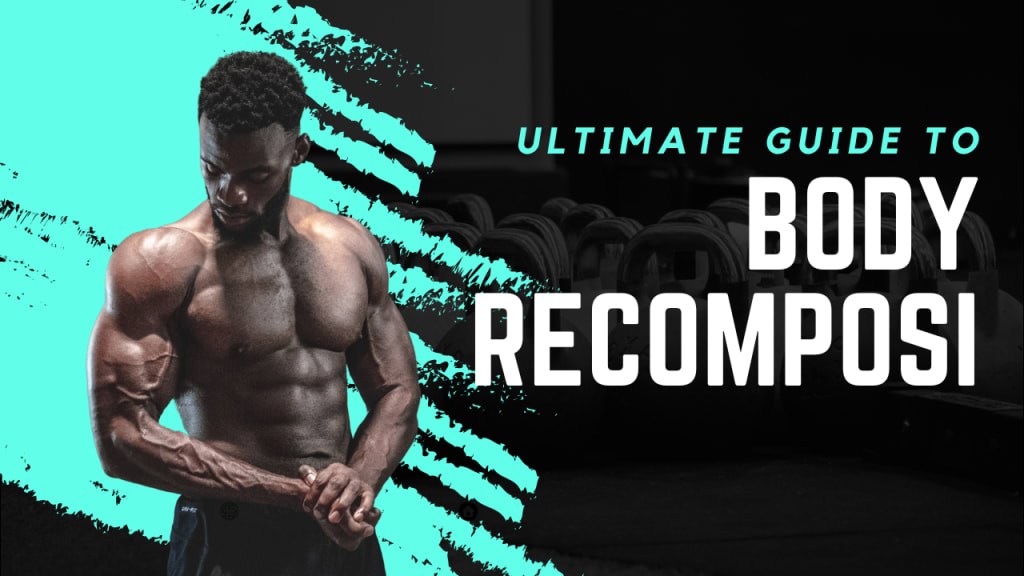The Body Transformation Blueprint: Your Complete Guide to Recomposition
A comprehensive guide to achieve your dream body through body recomposition. Learn about nutrition, resistance training, cardio, supplementation, and lifestyle factors to create a personalized plan for optimal results. Follow our sample plan and track your progress for a healthier and happier you.

Body recomposition is all about transforming your physique by losing fat and gaining muscle at the same time. It sounds simple enough, but let's face it, it's easier said than done. But fear not, because with the right guidance and a little bit of grit, you can make it happen.
So, what exactly is body recomposition? It's the process of changing your body's composition by reducing your body fat percentage and increasing your muscle mass. It's not just about losing weight, it's about building a stronger and leaner body. And why is it important? Because having a healthy body composition can improve your overall health, boost your confidence, and help you feel more energized.
In this ultimate guide to body recomposition, we'll cover everything you need to know to achieve your goals. From setting achievable targets, tracking your progress, and designing a nutrition plan that works for you, to creating a resistance training and cardio program that will challenge your body and help you grow, we've got you covered.
But body recomposition is not just about what you eat and how you exercise. It's also about lifestyle factors such as sleep and stress management. And let's not forget the importance of supplementation and how it can aid in your journey.
So, let's dive in and explore the world of body recomposition together. Are you ready to take on this challenge and create the body you've always wanted? Let's do this!
Understanding Body Composition
let's get down to brass tacks and discuss body composition. What exactly is it? In a nutshell, body composition refers to the percentages of fat, muscle, bone, and water in your body. It's not just about how much you weigh, but also about the quality of your weight.
There are several ways to measure body composition, including bioelectrical impedance, skinfold measurements, and DEXA scans. Each method has its pros and cons, but they all provide valuable information about your body.
Now, let's talk about body fat percentage. This is the proportion of your body weight that is composed of fat. It's an essential metric to keep an eye on, as having too much body fat can lead to a host of health problems. The ideal body fat percentage varies depending on age, gender, and fitness level, but generally speaking, a healthy range for men is 10-20%, while for women, it's 20-30%.
On the other hand, muscle mass refers to the weight of your muscle tissue. Having more muscle mass not only gives you a more toned appearance, but it also helps boost your metabolism and overall health. Resistance training is the most effective way to increase your muscle mass.
Water and bone are also important components of body composition. Your body is mostly made up of water, and bone density is crucial for maintaining strong and healthy bones.
Understanding your body composition is essential for achieving your fitness goals. By knowing your body fat percentage, muscle mass, and other factors, you can create a personalized plan that's tailored to your needs. Whether you're trying to lose weight, build muscle, or simply maintain your current body composition, understanding your body composition is the first step towards success.
keep in mind that body composition is more than just a number on a scale. It's a comprehensive look at the quality of your weight, including fat, muscle, bone, and water. By tracking your body composition and understanding the various components that make it up, you can make informed decisions about your health and fitness journey. So, let's get started!
Resistance Training for Body Recomposition
One of the most crucial steps in achieving body recomposition is having clear, achievable goals and tracking your progress along the way. This will help keep you motivated and on track towards achieving your desired results.
first, when setting goals, it's important to make them specific, measurable, and realistic. Saying "I want to lose weight" is too vague. Instead, try setting a specific goal like "I want to lose 10 pounds in the next two months." This way, you have a clear target to work towards, and you can measure your progress along the way.
Another important aspect of goal-setting is making them realistic. While it's great to aim high, it's crucial to set goals that are achievable. Saying "I want to lose 50 pounds in a month" is not only unrealistic, but it can also be dangerous for your health. Instead, try setting smaller, attainable goals that will lead you towards your ultimate goal.
Once you've set your goals, it's time to start tracking your progress. There are several ways to do this, including taking progress photos, measuring your body fat percentage, or tracking your workouts and nutrition. Whatever method you choose, make sure you're consistent and track your progress regularly. This way, you can see how far you've come and adjust your plan if necessary.
But, let's be real, tracking progress can be challenging, and it's easy to get discouraged if you're not seeing the results you want. That's why it's important to celebrate your small victories along the way. Did you lift a heavier weight in the gym? Did you stick to your nutrition plan for a whole week? Celebrate these wins and use them as motivation to keep pushing forward.
setting goals and tracking progress is an essential part of achieving body recomposition. Make sure your goals are specific, measurable, and realistic, and track your progress regularly. And remember, celebrate your small victories along the way and use them as motivation to keep moving forward. You got this!
Nutrition for Body Recomposition
When it comes to achieving your desired physique, your diet plays a significant role. Whether your goal is to build muscle or lose fat, your nutrition plan should be tailored to your specific goals and needs.
First and foremost, it's important to understand that there is no one-size-fits-all approach to nutrition. What works for one person may not work for another. So, it's crucial to find a nutrition plan that works best for you and your lifestyle.
When it comes to building muscle, protein is the key player. Protein helps repair and build muscle tissue, making it essential for muscle growth. So, if your goal is to build muscle, make sure you're consuming enough protein in your diet. Good sources of protein include chicken, turkey, fish, eggs, and tofu.
On the other hand, if your goal is to lose fat, creating a calorie deficit is essential. This means consuming fewer calories than your body needs to maintain its current weight. However, it's important to make sure you're still getting all the nutrients your body needs. Incorporating plenty of fruits and vegetables into your diet can help ensure you're getting the necessary vitamins and minerals.
But, nutrition plan can be challenging. It's easy to fall off track and indulge in your favorite treats. That's why it's important to practice moderation and balance. Allow yourself the occasional treat, but make sure you're still sticking to your overall nutrition plan.
And don't forget to stay hydrated! Drinking plenty of water can help keep you feeling full and energized throughout the day.
nutrition plays a crucial role in achieving body recomposition. Whether your goal is to build muscle or lose fat, find a nutrition plan that works best for you and your lifestyle. Make sure you're consuming enough protein for muscle growth or creating a calorie deficit for fat loss. And remember, practice moderation and balance, and stay hydrated. You got this!
Resistance Training for Body Recomposition
Alright, my friends, let's talk about resistance training for body recomposition! Resistance training, also known as weight training, is an essential component of building muscle and achieving your desired physique.
First off, let's get one thing straight - lifting weights won't make you bulky unless you're actively trying to bulk up. In fact, resistance training can help you build lean muscle mass, which can help you burn fat and increase your metabolism. Plus, who doesn't want to feel strong and powerful, am I right?
When it comes to resistance training, there are many different exercises and techniques you can incorporate into your routine. Some popular exercises include squats, deadlifts, bench press, and overhead press. These exercises target multiple muscle groups and can help you build overall strength and muscle mass.
But, it's not just about the exercises you do - it's also about how you do them. It's essential to focus on proper form and technique to prevent injury and ensure you're targeting the intended muscles. Don't be afraid to ask for help from a personal trainer or knowledgeable friend if you're unsure about proper form.
When it comes to resistance training, consistency is key. It's important to create a routine and stick to it. Aim to strength train 2-3 times per week, and gradually increase the weight and intensity over time. And don't forget to allow your muscles time to rest and recover - this is when the magic happens!
In conclusion, resistance training is an essential component of achieving body recomposition. It can help you build lean muscle mass, burn fat, and increase your metabolism. Incorporate exercises that target multiple muscle groups, focus on proper form and technique, and aim for consistency in your routine. And remember, lifting weights doesn't make you bulky - it makes you strong and powerful!
Cardio for Body Recomposition
let's talk about cardio for body recomposition! Cardio, short for cardiovascular exercise, is an essential part of any fitness routine. Not only can it help you burn calories and lose fat, but it can also improve your heart health and overall endurance.
There are many different forms of cardio, from running to cycling to swimming. The key is to find a type of cardio that you enjoy and can stick to consistently. If you hate running, don't force yourself to run - try something else like dancing, hiking, or kickboxing.
In addition to finding a type of cardio you enjoy, it's also important to vary your workouts to prevent boredom and avoid hitting a plateau. Mix up your routine by trying different types of cardio, adding intervals or sprints, or increasing the intensity or duration of your workouts.
But, don't forget that cardio isn't the only way to achieve body recomposition. Resistance training, as we talked about earlier, is also crucial for building lean muscle mass and increasing your metabolism.
In fact, incorporating both cardio and resistance training into your routine can be a powerful combination for achieving your desired physique. And, let's not forget the mental benefits of exercise - it can boost your mood, reduce stress, and improve your overall quality of life.
So, don't shy away from cardio - embrace it as an essential component of your fitness routine. Find a type of cardio you enjoy, vary your workouts to prevent boredom, and remember to also incorporate resistance training for maximum results. Let's get moving and make our bodies strong and fierce!
Supplementation for Body Recomposition
While a healthy diet and consistent exercise routine are the foundation for achieving your desired physique, certain supplements can be a helpful addition to your regimen.
Before diving into supplements, though, it's important to note that they are just that - a supplement to a healthy lifestyle. They should not be relied upon as a quick fix or used as a substitute for proper nutrition and exercise.
With that said, let's explore some of the supplements that may be beneficial for body recomposition. Protein powder is a popular choice for those looking to increase their protein intake and support muscle growth. There are many different types of protein powders on the market, from whey to plant-based options, so it's important to find one that works for you and fits within your dietary needs.
Creatine is another supplement that has been shown to aid in muscle growth and performance. It's important to note, however, that it may not be necessary for everyone and should be used with caution, especially if you have pre-existing medical conditions.
Other supplements that may be beneficial for body recomposition include caffeine, which can help boost energy and endurance during workouts, and omega-3 fatty acids, which have been shown to support heart health and reduce inflammation.
But, before adding any supplements to your routine, it's important to do your research and consult with a healthcare professional. They can help guide you in making informed decisions and ensure that any supplements you take are safe and effective.
So, my friends, while supplements can be a helpful addition to a healthy lifestyle, they are not a magic solution. Focus on maintaining a nutritious diet, consistent exercise routine, and consult with a healthcare professional before adding any supplements to your regimen. Let's work towards our fitness goals in a safe and sustainable way.
Lifestyle Factors for Body Recomposition
When it comes to body recomposition, nutrition and exercise are important, but they're not the only factors to consider. Your lifestyle habits play a significant role in your ability to achieve your goals.
it's essential to get enough sleep. Sleep is when your body recovers and repairs itself, so if you're not getting enough rest, you're not giving your body the chance to rebuild and grow. Aim for 7-9 hours of sleep per night.
Stress management is also crucial. Stress can lead to overeating, poor food choices, and lack of motivation to exercise. Find activities that help you relax, such as meditation, yoga, or deep breathing exercises.
Hydration is another lifestyle factor that shouldn't be overlooked. Dehydration can lead to decreased energy levels and a slower metabolism. Make sure you're drinking enough water throughout the day, especially during and after exercise.
Lastly, consider the company you keep. Surrounding yourself with like-minded individuals who support your goals can help keep you motivated and accountable. On the other hand, being around people who don't prioritize health and fitness can make it challenging to stick to your plan.
By prioritizing sleep, managing stress, staying hydrated, and surrounding yourself with a supportive community, you'll set yourself up for success in your body recomposition journey. Remember, every small lifestyle change adds up over time, and consistency is key.
Putting it All Together: Sample Body Recomposition Plan
So you've learned about the importance of body composition, how to set goals and track your progress, what to eat, how to train with weights and cardio, what supplements to consider, and how lifestyle factors play a role in body recomposition. Now, it's time to put it all together and create a sample body recomposition plan.
First things first, let's set some goals. Remember, goals should be specific, measurable, achievable, relevant, and time-bound. Decide what you want to achieve, whether it's losing fat, gaining muscle, or both, and write down your goals. For example, "I want to lose 10 pounds of fat and gain 5 pounds of muscle in the next 12 weeks."
Next, it's time to create your nutrition plan. You'll need to calculate your daily caloric needs based on your goals and activity level, and then set your macronutrient ratios. Aim for a moderate protein intake, a higher carbohydrate intake on training days, and a moderate to low carbohydrate intake on rest days. Fill the rest of your calories with healthy fats. Keep in mind that consistency is key, so aim to stick to your plan at least 80% of the time.
Now let's talk about your workout plan. Resistance training should be your focus, so plan to lift weights at least 3-4 times per week, with a mix of compound and isolation exercises to target all major muscle groups. Cardio should be used as a tool to burn extra calories and improve cardiovascular health, so aim for 2-3 sessions per week, either steady-state or high-intensity intervals. Don't forget to incorporate rest and recovery days to allow your muscles to repair and grow.
Supplementation can also play a role in supporting your body recomposition goals. Consider adding a high-quality protein powder, creatine, and/or caffeine to your routine, but remember that supplements should never replace a healthy diet and consistent exercise.
Finally, lifestyle factors like sleep, stress management, and social support can greatly impact your success. Aim for 7-9 hours of quality sleep per night, find healthy ways to manage stress like meditation or yoga, and surround yourself with a supportive community to keep you motivated and accountable.
Remember, body recomposition is a journey, not a destination. Be patient, stay consistent, and celebrate your progress along the way. With a well-rounded plan in place, you'll be on your way to achieving the body you desire.
conclusion
Congratulations! You've made it to the end of this ultimate guide to body recomposition. We've covered a lot of ground, from understanding body composition to creating a personalized plan that works for you.
Remember, body recomposition is a process that takes time, patience, and effort. It's not about achieving the perfect body overnight, but about making small, sustainable changes to your lifestyle that will lead to long-term results.
By setting realistic goals, tracking your progress, fueling your body with nutritious foods, engaging in resistance training and cardio, supplementing when necessary, and taking care of your lifestyle factors, you can achieve your body recomposition goals.
But most importantly, remember to enjoy the journey. Celebrate your small victories, and don't be too hard on yourself if you slip up. Every day is a new opportunity to get back on track.
So go out there and crush your body recomposition goals. You've got this!





Comments
There are no comments for this story
Be the first to respond and start the conversation.